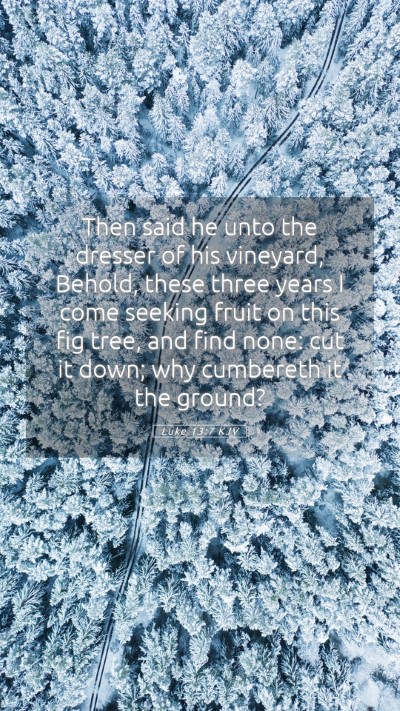Bible Verse Explanation: Luke 13:7
Bible Verse: "And he said unto the dresser of his vineyard, Behold, these three years I come seeking fruit on this fig tree, and find none: cut it down; why cumbereth it the ground?" (Luke 13:7, KJV)
This verse is a pivotal part of a parable told by Jesus and is rich with meaning. In understanding this Scripture, we can delve into several key interpretations and applications.
Context and Significance
The context of Luke 13:7 is significant. Jesus uses the fig tree as a symbol to convey deeper spiritual truths. The vineyard represents God's people, and the tree represents individual believers or nations. Here, the lack of fruit signifies a failure to bear the fruits of repentance and righteous living, which is a recurring theme in Jesus’ teachings.
Insights from Public Domain Commentaries
Matthew Henry's Commentary
According to Matthew Henry, this verse illustrates God's patience and the expectation He has for His people to produce spiritual fruit. The three years mentioned symbolize a period of grace during which God seeks to bring people to repentance. The caretaker's plea to allow the fig tree a chance to bear fruit underlines the mercy of God, who desires that none should perish but that all should come to repentance (2 Peter 3:9).
Albert Barnes' Commentary
Albert Barnes notes that this parable emphasizes the importance of personal responsibility in our spiritual lives. The owner of the vineyard is frustrated by the unproductive tree, reflecting God's disappointment with those who do not fulfill their purpose. Barnes emphasizes that fruitfulness is not just a matter of faith but requires active engagement with one’s faith, leading to tangible results in one’s life.
Adam Clarke's Commentary
Adam Clarke perceives a deeper allegorical meaning in the fig tree as the Jewish nation, particularly during the time of Jesus. He points out that Jesus’ plea to spare the tree for another year symbolizes the period of grace given to Israel before His eventual rejection of them as His chosen people due to their failure to accept Him and the message of the gospel. Clarke also remarks on the urgency of repentance, underlining that such grace is not to be taken for granted.
Application of the Verse
This verse serves as a critical reminder for believers today. The expectation to bear fruit implies that Christians must live out their faith through good works and a life reflective of Jesus Christ. As we explore the meaning of Bible verses within our Bible study groups or online Bible study sessions, Luke 13:7 challenges us to introspectively assess our lives. Are we truly bearing fruit? Are we remaining stagnant in our spiritual growth?
Cross References
- Matthew 21:19 - Jesus curses the barren fig tree, which further emphasizes the expectation of fruitfulness.
- John 15:2 - "Every branch in me that beareth not fruit he taketh away: and every branch that beareth fruit, he purgeth it, that it may bring forth more fruit." This supports the theme of divine expectation for fruitfulness.
- Romans 2:6-8 - Paul discusses how every person will receive according to their deeds, echoing the call for fruitful lives.
Conclusion
In conclusion, Luke 13:7 serves as a powerful reminder of God’s patience and mercy, yet it urges us to take our spiritual life seriously. Understanding this Bible verse commentary allows us to grasp the significance of producing fruits of the Spirit, contributing to our Bible study insights and practical application in daily life. By interpreting this verse through various lenses, we can enhance our Biblical exegesis and deepening appreciation of Scripture.
As we engage with this verse, let's strive to embody the teachings of Jesus, ensuring that our lives reflect the love and grace bestowed upon us. It’s a call to action that resonates deeply with the core of Christian living—producing fruit that honors God.


